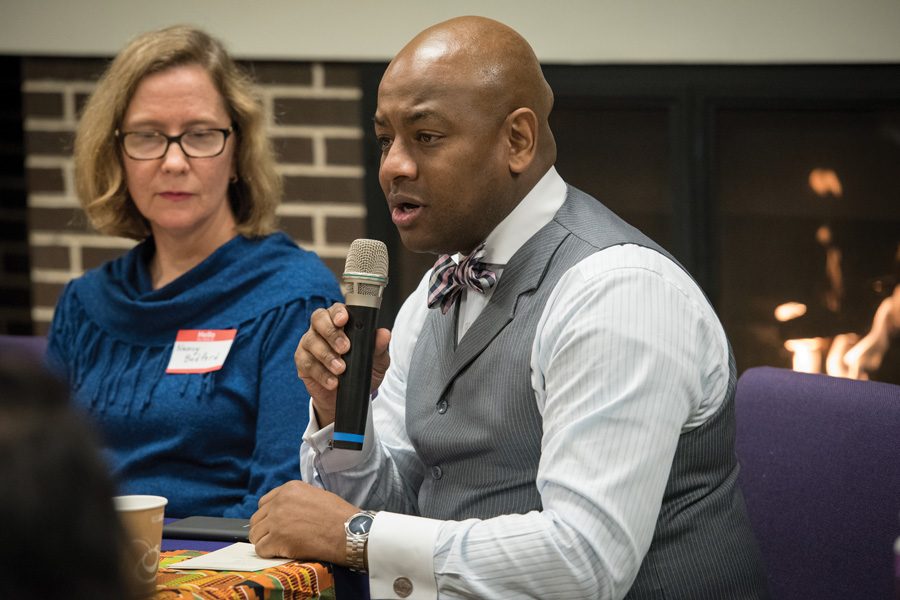Sheil panelists discuss faith’s role in combatting racism
Christian Surtz/The Daily Northwestern
Evanston Police Detective Loyce Spells speaks about Black Lives Matter at a panel on Thursday. Spells said Christians must combat racism and care for fellow people.
February 10, 2017
People of faith have a responsibility to speak out against discrimination and police brutality, panel members said at Sheil Catholic Center on Thursday.
Aireale Rodgers, the diversity and inclusion program coordinator at The Graduate School, said the informal panel was supposed to facilitate dialogue about people’s experiences with police in a safe space. Throughout the panel, attendees asked questions of the five-person panel, which included an Evanston Police detective, professors, alumni and religious community members.
Rodgers asked panelists to create a six-word story about their interactions with police officers and then asked how Christians should support those around them.
Evanston Police detective Loyce Spells, who was one of the panelists, said he initially had concerns about joining the police force because he never had positive interactions with police growing up in the West Side of Chicago.
Spells said he felt a religious conviction to become an officer, but he had to reconcile with his negative perception of police. He said his six-word story, “First the target — now the solution,” outlined his feelings now.
“There (was) no way that I would be called to such a profession not knowing that it was the best thing ever for me,” Spells said. “Every time that we turn on our television and we see another (police killing), it is knocking the scab off of healing wounds from yesterday, and I am blessed with the opportunity to be a part of that solution today.”
Others on the panel said combatting racism means assessing privileges and asking what the individual can do with them.
Nancy Bedford, a theologian at Garrett-Evangelical Theological Seminary, said Christians should be concerned for the “flourishing” of humanity.
“We each have gifts, graces and sometimes privilege,” Bedford said. “So can those things be used, even things that are negative, such as white privilege? … How can white bodies be put to work for justice?”
Defying stereotypes can also defy racism, panelist Jonathan Little said. Little works with restorative justice projects through the Precious Blood Ministry of Reconciliation to talk with at-risk youth.
Little said he doesn’t watch television news because the negative coverage of Chicago crime paints a violent narrative.
“Every African-American with dreads are not the same,” Little said. “One of my main goals is to put out there in the media that it’s not all negativity where you come from in our community. There are a lot of positive things, people that are trying to work together.”
Correction: A previous version of this story misstated Aireale Rodgers’ title. She is the program coordinator. The Daily regrets the error.
Email: ericasnow2019@u.northwestern.edu
Twitter: @ericasnoww



